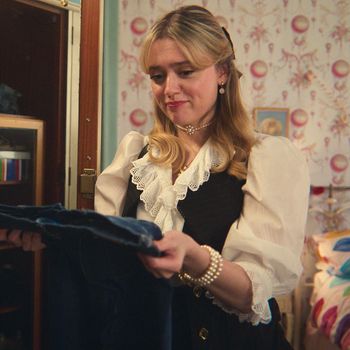
Oftentimes, the best episodes of Sex Education take a top-down approach, beginning with an event (usually school centric) that justifies everyone sharing the same space, then peppering in individual character arcs where they fit. It’s a useful way to bring several conflicts to a head at once, rather than starting with a dozen character arcs and tangling them into a messy web.
“Episode Six” is one of those episodes. It’s the funeral episode we knew was coming. Finally, Maeve is forced to acknowledge the feelings she’s been trying to tamp down and reconcile her various complicated feelings about her late mother. But despite the big meeting at the end of the last episode, this one picks up without majorly addressing Otis and Maeve’s late-night trip to Moordale Secondary School. We see that Jean is still concerned about the influence Maeve has on her son, but there’s no time for her and Maeve to interact directly. Besides, Otis still feels sour toward Jean, especially after O shows up to go over that night’s radio show. Their rivalry is alive and well, despite Otis’s “cancellation,” and he’s still fighting to stay in the student-counselor race.
By the end of the episode, Ruby has pulled the trigger and called into Sexology to expose her primary-school bully, sickened by how grateful Cal’s mom sounded for O’s advice. Now, I’m not sure this fully makes sense from a plot perspective: It’s a little silly that Ruby has access to a video of the “bed wetter” incident, and I’m also doubtful that teasing another kid at that age would be enough to really tank your reputation years later, especially if it mainly only happened once. (Maybe that’s part of the show’s light critique of Cavendish’s ultra-enlightened Gen-Zers.) But it works well enough to get this story where it needs to be, leveling the playing field for Otis.
Besides, in general, this is another really good episode for O, who shares a poignant and very necessary conversation with Jean at her house. Just as we’ve seen O extract vulnerable confessions from her fellow students at Cavendish, she’s able to get Jean talking about her fear of losing her career the moment she stops working. (The workplace is not kind to mothers, generally speaking.) After Remi left ten years ago, she spent days crying in bed. She set her career aspirations aside to prioritize the clinic and, especially, her relationship with her son. Now she actually wants to return to those old goals but isn’t sure she’s ready, especially with the side effects of her new antidepressant prescription. O’s suggestion for Jean to trust herself might be her most compassionate moment yet.
By and large, though, this is an episode focused on the kids we’ve spent four seasons watching. As in previous installments, grief doesn’t stop anyone from dwelling on their own personal dramas; it might feel as though the world has stopped turning, but things keep happening anyway. Jackson’s cancer anxiety, for example, is at an all-time high, represented by some genuinely unnerving hallucinations of testicular imagery. (He’s also questioning Viv’s relationship with Beau, which seems a little intense for how long they’ve been dating.) Thankfully, his lump turns out to be benign. I was not looking forward to a Dawson’s Creek–style character death in the series finale.
The funeral allows for an Eric-Adam reunion, which Annalisa D’Innella’s script handles beautifully. I’d started to worry they wouldn’t interact again on this show, but the tenor of their interactions here feels entirely appropriate to each character; the stakes are a little higher for Adam, being the dumpee who still misses Eric. I love that they can set aside their hurt feelings and discuss their respective coming-out journeys again, with Adam still looking to Eric as a shining example of self-love overcoming shame. His discovery that his parents are sleeping together is upsetting, sure. But the Adam we see seeking comfort from a horse at the end of this episode is so much healthier, kinder, and more secure than the Adam of season one. His evolution has been profound.
Eric also gets the opportunity to finally address the issues that have been building between him and Otis. During their trip to pick up a floral arrangement from Maeve’s brother and his roommate Dodgy Mo, he points out the hypocrisy of Otis taking their queer night miscommunication so personally. It’s okay that Eric has queer and Black friends who understand his day-to-day reality in a way that Otis just can’t. But, coming from a wealthy family and being straight and white, Otis doesn’t understand why their differences need to be a problem in their friendship. He’s too defensive, determined to see any gentle reminder from Eric as an insult. Like Jean, he can be incredibly empathetic to his patients and friends, but he can’t step outside of his point of view when things get personal.
While Eric is much more “in the right” than Otis, I can easily imagine feeling the same way as Otis in this scenario. In the weakest moments of this show — in season two, mostly — his hypocrisy can be unbearable, a risk to our investment in the show’s main character. But here, it’s easy to see why Otis is in so much pain. I ached for him when he asked, “We have stuff in common as well, right?”
What makes the conclusion of this story so crushing is that Otis and Eric just spent several scenes talking through their issues. There are no misunderstandings here and no blow-out screaming matches, only two people refusing to hear each other. The sad, realistic truth is that some people just grow apart or stop relating to each other. It’s one of Otis’s greatest fears, really. What if some gaps in understanding can’t be bridged, even with your best friend?
The funeral provides a surprisingly effective backdrop for this story. But “Episode Six” always returns to Maeve and where she’s at emotionally. Early in the episode, she’s doing everything she can to stay calm, knowing she’ll need to decide on returning to the U.S. eventually. Everything is happening too fast, and she needs some stability; perhaps that’s why she removes one variable from the board by telling Aimee she’d be uncomfortable if she dated Isaac.
Aimee accepts this immediately and does Maeve the kindness of inviting many of her old Moordale acquaintances, including Miss Sands and Mr. Hendricks. But everything keeps going wrong: The pallbearers almost drop the coffin, the sound system stops working in the middle of Erin’s favorite song, and Sean shows up late only to call his dead mother a “dirty junkie” at her own funeral.
Sean is not a favorite character of mine, and I loathed him a little bit in this scene. But it’s clear where he’s coming from emotionally, especially when he brings up the fact that Maeve will escape this place while he rots away and dies alone. It’s nice that the script gives Isaac the opportunity for a hero moment, reminding Maeve that Sean is in pain and giving her the pep talk she needs to get back in there and tell her friends about Erin.
Again, Emma Mackey does some of her best acting work of the whole show here, especially in that powerful moment when her voice catches and she needs a moment before she can continue. As she points out in her off-the-cuff speech, people are complicated, and two things can be true: You can hate someone for what they put you through while still loving and missing them with “every cell of your being.”
Sex Education has always been a series that wholeheartedly believes in the ability of people to change and grow, but it also understands that it doesn’t happen overnight. We see that with Otis, whose sex issues at the end of “Episode Six” serve as a handy full-circle moment to set the stage for the final two episodes, and we see it with Maeve, who doesn’t yet have the strength to consider leaving her comfort zone again.
The people we were as children are still with us today, no matter how different we’ve become. Perhaps for those who refuse to even try to change, remaining stubbornly themselves to the very end, those earlier versions loom even larger. But maybe part of change is embracing those former selves: looking them in the eye and acknowledging them. It’s worth it to shed your ego and see life with clear eyes — to try breaking the patterns that don’t serve you, even if you fail, even if you find yourself without the guiding voice you need most. Not even the luckiest of us can avoid losing people along the way.
All the Good Things and the Bad Things That May Be
• Cal has a major dysphoric moment after getting their period while hooking up with Aisha in the restroom. It’s not about Aisha, who doesn’t mind the blood at all. It’s about feeling like they’ve taken two steps back after over half a year on testosterone. I hope Cal’s mom can make an effort and get through to them again because it’s heartbreaking to see them in such a hopeless state.
• I still don’t really care about whether Jean gives Joanna a loan or not, but we finally get confirmation that Dan is Joy’s father when the sisters run into him at the market. Jean gets Joanna to say she won’t see him again, but I imagine there’s more to come here.
• It turns out the homeless woman from the last episode is actually God (Jodie Turner-Smith), who keeps appearing in Eric’s visions. Other signs keep popping up wherever he goes, including the tropical fish on Dodgy Mo’s shirt and Adam’s butchering of the word “effervescent.”
• A very background detail that ties back to Eric’s vision: You can hear an announcement that tropical fish is now half-price at the market.
• Nice appearance from Jeffrey, who says that Cynthia couldn’t come because funerals remind her of Jonathan (her cat who got crushed by a microwave while they were having sex last season). And it really does feel nice to see the Moordale teachers one last time. Miss Sands expressing her pride in Maeve is another tear-jerking moment.
• To be honest, I kind of could’ve done without the U2 singalong, but that’s probably because no show will ever be able to top The Americans’ use of “With or Without You” in the series finale.
• It’s a little odd that we don’t see Anna and Elsie in this episode, no?
• Aimee is figuring out what she wants her art to explore, including her fury at men who tell her to smile. This remains a low-key but very poignant side story, like all Aimee stories.




